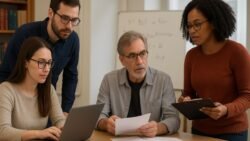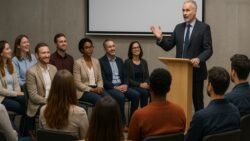Summer School on Critical Thinking – The Summer School on Critical Thinking, Logic, and Theories of Truth offers students, researchers, and professionals a unique opportunity to engage deeply with some of the most pressing intellectual skills required in today’s fast-changing world. This program has been designed to equip participants with the ability to evaluate arguments, detect fallacies, and apply logical frameworks to real-world issues. By combining theoretical foundations with practical applications, the summer school helps foster clarity of thought, effective reasoning, and a deeper understanding of truth. In an era dominated by information overload, the capacity to discern reliable knowledge from falsehoods is not just an academic pursuit but an essential life skill. Participants will be introduced to classical logic, modern theories of truth, and contemporary debates in epistemology and critical thinking. Alongside lectures, interactive workshops and discussions will ensure active engagement, making learning both rigorous and rewarding. This immersive program thus promises intellectual growth and professional development in equal measure.

 Research at the Institute of Epistemics: Bridging Philosophy, Logic, and Cognitive Science
Research at the Institute of Epistemics: Bridging Philosophy, Logic, and Cognitive Science
Critical Thinking: A Tool for the Modern World
Critical thinking lies at the heart of this summer school, as it empowers individuals to question assumptions, analyze perspectives, and evaluate the soundness of arguments. In a global environment where decisions are influenced by politics, technology, and media, the ability to think critically is indispensable. The program introduces participants to the methods of identifying biases, assessing evidence, and making reasoned judgments. Through case studies and problem-solving exercises, students learn to apply these skills to complex real-world situations. This not only strengthens academic capabilities but also builds confidence in professional and personal decision-making. By cultivating intellectual humility, participants are encouraged to remain open to new evidence while maintaining a firm commitment to rationality. The focus on critical thinking ensures that graduates of this summer school emerge as informed individuals who can contribute meaningfully to society and their chosen fields.
 Public Lectures and Free Webinars on Knowledge Ethics, Science, and Reason in the 21st Century
Public Lectures and Free Webinars on Knowledge Ethics, Science, and Reason in the 21st Century
Logic as the Foundation of Reasoning
The study of logic forms a central pillar of the summer school, providing participants with the structural tools necessary for rigorous reasoning. Classical syllogisms, propositional logic, and predicate logic are introduced to demonstrate how arguments are constructed and evaluated. By understanding the mechanics of validity, soundness, and inference, participants gain clarity in both written and verbal communication. The curriculum also explores the relevance of logic in modern fields such as artificial intelligence, law, and philosophy, demonstrating its broad applicability. Interactive sessions allow participants to solve logical puzzles, test arguments, and practice formal proofs, ensuring a balance between theory and application. Importantly, logic is not presented as an abstract discipline but as a skill that enhances clarity in everyday reasoning. By mastering logical principles, participants develop a sharper analytical mind capable of dissecting complex problems and constructing persuasive arguments.
 Peer-Reviewed Journals, Monographs, and Whitepapers Published by the Institute of Epistemics
Peer-Reviewed Journals, Monographs, and Whitepapers Published by the Institute of Epistemics
Theories of Truth: Exploring Diverse Perspectives
The summer school further enriches intellectual exploration by focusing on theories of truth, a subject central to philosophy and modern discourse. Participants are introduced to classical correspondence theory, coherence theory, pragmatic accounts, and contemporary deflationary approaches. By comparing these perspectives, students learn how truth has been conceptualized across history and how it shapes knowledge and belief. Real-world implications of these theories are discussed, such as their relevance in science, journalism, politics, and ethics. For instance, understanding correspondence theory helps evaluate factual reporting, while pragmatic theories shed light on how truth operates in applied contexts. Through guided discussions, participants grapple with challenging questions such as whether truth is absolute, relative, or context-dependent. These sessions stimulate intellectual curiosity while highlighting the value of truth as a cornerstone of human understanding. By the end, participants will have a nuanced appreciation of truth’s complexities in both academic and everyday settings.
 Epistemology for the Modern Mind: Online & Offline Certificate Courses Offered by the Institute
Epistemology for the Modern Mind: Online & Offline Certificate Courses Offered by the Institute
An Invitation to Apply and Engage
The Summer School on Critical Thinking, Logic, and Theories of Truth is more than an academic program—it is a transformative journey. Applicants are invited from diverse academic and professional backgrounds, ensuring rich cross-disciplinary dialogue. Whether one is a student of philosophy, a researcher in science, a teacher, or a professional seeking sharper analytical tools, the program offers valuable insights. The interactive format, with its blend of lectures, workshops, and peer discussions, ensures active participation and dynamic learning. Beyond academic enrichment, the summer school fosters networking, collaboration, and intellectual friendships that extend beyond the classroom. By applying now, participants secure an opportunity to refine their reasoning abilities, deepen their philosophical understanding, and strengthen their professional profile. Ultimately, this program is an investment in intellectual growth, equipping individuals with the skills to navigate complexity, embrace truth, and lead with clarity in an uncertain world.
